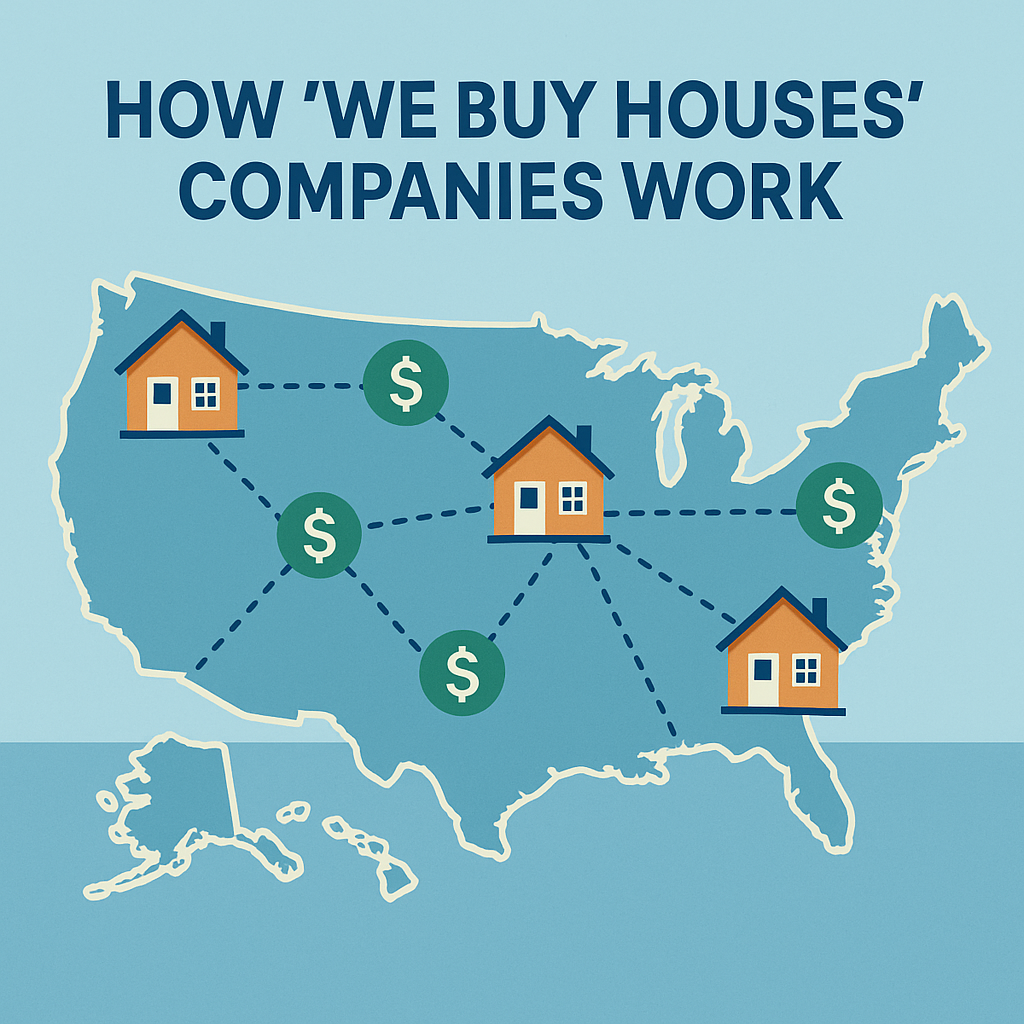This guide pairs with our deeper dives on Partnership Value Index (PVI): Novation vs. Cash, Ways to Sell Your House, and How to Sell Your House Fast in Today’s Market.
- Our E-E-A-T (Experience, Expertise, Authoritativeness, Trust)
- What “We Buy Houses” Actually Means
- Step-by-Step: How a Professional Cash Buyer Works
- Buyer Types (Local, National, Franchise)
- Pros & Cons vs. Listing
- Deal Outcome Simulator: Listing vs. Cash vs. Hybrid
- Offer Math: ARV, Repairs, Holding, Risk
- Seller Scenarios: Who Cash Works Best For
- How to Vet a Reputable Buyer & Red Flags to Avoid
- Datasets That Explain Why Cash Competes in 2025
- Listing vs. Cash vs. Hybrid—Side-by-Side
- Deeper Guides Inside Local Home Buyers USA
- Where We Buy (State Pages) · FAQ · Dataset & License Notes
1) Our E-E-A-T: Why This Guide Is Trustworthy
Experience
Local Home Buyers USA purchases homes as-is nationwide and coordinates with neutral, licensed title and escrow companies. We routinely work through liens, delinquent taxes, probate sales, HOA demands, and tenant occupancy—so this guide reflects hands-on transaction experience, not theory.
Expertise
We use the same underwriting discipline in our offers that we explain here: clear ARV targets, honest repair scopes, realistic holding & transaction costs, and explicit risk buffers. Our Offer & Closing Lab runs internal experiments on different offer structures and timelines.
Authoritativeness
For market context we cite public datasets you can verify yourself:
- FHFA HPI for national/state/metro price trends.
- Freddie Mac PMMS via FRED for 30-year mortgage rates.
- Redfin Data Center for cash share, inventory, sales velocity.
- ATTOM for seller profit trends.
Trust
We publish clear contact information, use neutral title/escrow, provide proof-of-funds on request, and encourage you to compare multiple written offers. For more on blended sale strategies, see Partnership Value Index: Novation vs. Cash and Novation 101: Partner with an Investor.
2) What “We Buy Houses” Actually Means
A professional “We Buy Houses” company purchases your property as-is with verified funds, removes most financing and appraisal risk, and aims to close on your timeline. You skip public showings, many repairs, and a lot of re-negotiation. The buyer coordinates title/escrow, orders payoffs, and records the deed at the county.
See also: 7 Ways to Sell a House in Today’s Market and America’s As-Is Divide & Investor Capital for how investors and retail buyers value homes differently.
3) Step-by-Step: How a Professional Cash Buyer Works
- Intro call & property snapshot — Address, condition, occupancy, liens/HOA, and your ideal timeline.
- Walkthrough (in-person or virtual) — Confirm repairs and condition so the offer math is honest.
- Written cash offer — Price, who pays what, target close, and contingencies. Ask for a written net sheet.
- Contract & title/escrow — Earnest money is deposited, title is opened, payoffs/HOA/resale packages are ordered, and any curative work is started.
- Close & fund — You sign in person or via e-closing (where allowed) and proceeds are wired to your account after recording.
4) Buyer Types (Local, National, Franchise)
Local Cash Buyers
Local operators tend to know street-by-street values, permitting bottlenecks, and investor demand. They can be highly flexible on dates, post-closing occupancy, and odd situations.
National & Franchise Brands
National brands and franchises often run standardized playbooks with call centers, regional underwriting, and local partners. Processes are consistent, but sometimes less flexible on unique properties.
With any buyer, insist on proof of funds, plain-English contracts, and a reputable, neutral title/escrow company.
5) Pros & Cons vs. Listing
| Factor | Professional Cash Buyer | Traditional Listing (Agent + MLS) |
|---|---|---|
| Repairs | As-is; you can leave unwanted items. | Often required to compete. |
| Showings | None; one brief walkthrough. | Multiple showings and open houses. |
| Financing/Appraisal Risk | Minimal (no lender). | Common fall-through cause. |
| Timeline | ~7–14 days (title permitting). | 30–60+ days. |
| Fees | No listing commission; standard title/escrow. | 5–6% commission + concessions. |
| Net Proceeds | Optimized for speed & certainty. | Potentially higher gross, but with more time and friction. |
Timelines depend on liens, HOA payoffs, payoff statement speed, probate orders, and county recording times.
Adjust the sliders to see simplified, illustrative net proceeds under three paths. This is not a quote or promise—your real offer and net sheet will be customized to your address and state.
These outputs are simplified estimates, not advice. For a precise net sheet, request a written offer and review with your own advisor.
7) Offer Math: ARV → Repairs → Holding → Risk
Professional buyers price using a consistent framework:
- After-Repair Value (ARV) — The realistic retail value after reasonable improvements, not a dream number.
- Repairs & upgrades — Roof/HVAC/plumbing/electrical, interiors, code items, plus days to complete and contractor risk.
- Holding costs — Taxes, insurance, utilities, lawn/snow, HOA dues, and maintenance while the home is being worked on and sold.
- Transaction costs — Title, escrow, transfer taxes, resale commissions or buyer concessions.
- Risk buffer — Market swings, inspection surprises, and financing risk on the eventual resale.
Pro move: Ask buyers to show the line-item math. Good operators are comfortable walking through assumptions and welcome a second opinion from your contractor or attorney.
8) Seller Scenarios: Who Cash Works Best For
- Inherited / Probate — You want a simple, as-is sale, with curative title work and coordinated heirs. Pairs well with our probate resources and Ways to Sell guide.
- Relocation / Deadline — Job transfer, school timing, or a purchase contingency where certainty beats chasing the last dollar.
- Heavy Repairs — You don’t want to be a part-time general contractor. Selling as-is transfers construction risk to the buyer.
- Tenants / Occupancy — Sell with tenants in place, or with a post-closing occupancy agreement so you don’t have to move twice.
- Financial Stress — Behind on payments, taxes, or HOA dues and need a clean exit before foreclosure or a tax sale.
9) How to Vet a Reputable Buyer
- Registration — Verify the business in your state’s Secretary of State database.
- Reviews & references — Check independent reviews and ask a local title/escrow office whether they’ve closed with this buyer.
- Proof of funds — A privacy-safe bank statement or verification letter that matches the entity on your contract.
- Neutral title/escrow — You pick, or you mutually agree, on a licensed and insured settlement company.
- Contract clarity — No vague clauses. You should understand price, fees, contingencies, and exit options.
- Attorney review — When in doubt, have a local real-estate attorney review before signing.
10) Red Flags & Scam Avoidance
- “Sign today or the price drops” pressure tactics.
- Requests to skip escrow/title or wire money to odd accounts.
- Hidden assignment language or one-sided cancellation rights.
- No written net sheet; constantly shifting terms after inspection with no new information.
If something feels off, hit pause. For security-focused guidance, pair this guide with our Deed Fraud & Seller Scams (2025) article.
11) Datasets That Explain Why Cash Competes in 2025
Public sources let you cross-check broad statements:
- Mortgage Rates: Freddie Mac PMMS via FRED shows the 30-year fixed rate spending much of 2022-2025 above 6%.
- Prices & Equity: FHFA HPI confirms multi-year price gains that left many owners with strong equity cushions.
- Cash Share & Metro Trends: Redfin Data Center (see “Guidelines for Using this Data”) shows elevated cash share and varying metro-level dynamics.
- Seller Profits: ATTOM reports help contextualize profit cycles and where margins compress.
12) Listing vs. Cash vs. Hybrid—Side-by-Side
| Factor | Traditional Listing | Direct Cash (Local Home Buyers USA) | Hybrid / Novation |
|---|---|---|---|
| Close Time* | 30–60+ days | ~7–14 days (title permitting) | 30–90+ days |
| Repairs | Often required | As-is; we handle repairs & debris | Limited; negotiated in advance |
| Showings | Multiple | None | Minimal after novation |
| Appraisal/Financing | Frequent risk | None (no lender) | Low–moderate |
| Fees | 5–6% commission + concessions | No listing commission; standard closing costs | Disclosed service fee + standard costs |
| Best For | Max exposure if time & condition allow | Speed, certainty, and as-is convenience | Balancing net with reduced friction (see PVI: Novation vs Cash) |
*Subject to liens, HOA payoff timing, probate, lender response, and local recording practices.
13) Deeper Guides Inside Local Home Buyers USA
Ready to go deeper or compare strategies? Explore these related research pieces and playbooks:
- 7 Ways to Sell Your House — overview of retail, cash, novation, and more.
- How to Sell Your House Fast in Today’s Market — a complete, homeowner-friendly guide.
- America’s As-Is Divide & Investor Capital — why some homes attract investors more than retail buyers.
- Offer & Closing Lab — how we test new offer structures, timelines, and protections.
- Partnership Value Index (PVI): Novation vs. Cash — when partnering with an investor makes sense.
- Novation 101: Partner with an Investor — deep dive on hybrid, list-like strategies.
14) Where We Buy — State Pages
We buy houses nationwide. These state hubs are a good starting point; if yours isn’t listed, visit our full states index or request an offer and we’ll confirm coverage.
15) Frequently Asked Questions
Do “We Buy Houses” companies pay closing costs?
Many cover standard title and escrow fees, but practices vary. Always request a written estimate showing exactly who pays what in your state.
How fast can a cash buyer close?
With clear title and responsive payoff statements, roughly 7–14 days is common. Probate, HOA demands, or lien releases can extend timelines.
Will I need to make repairs?
No. Professional buyers purchase as-is and often let you leave unwanted items, which can save weeks of prep.
How is the price set?
Offers are based on ARV minus repairs, holding/transaction costs, and a risk buffer. Ask for a line-item breakdown and compare to your own contractor bids.
Should I get multiple offers?
Yes. Comparing at least two written offers is smart—buyers’ costs, timelines, and exit strategies differ, which impacts your net.
16) Dataset & License Notes
- Freddie Mac PMMS via FRED (MORTGAGE30US) — public reuse with attribution.
- FHFA House Price Index (HPI) — public national, state, and metro indices.
- Redfin Data Center — downloadable series (cash share, inventory, sales); reuse allowed with attribution per their “Guidelines for Using this Data.”
- ATTOM — year-end and quarterly seller profit reports.
Example attribution for charts: “Source: Freddie Mac PMMS via FRED; FHFA HPI; Redfin Data Center; ATTOM.”

